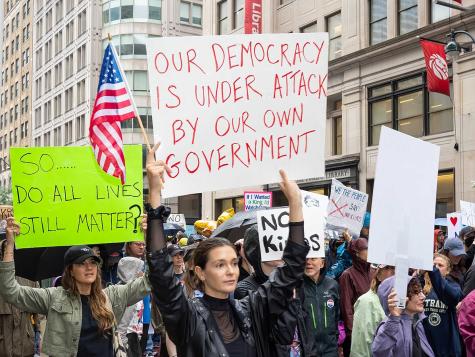Trump and Suppression

NSPM-7 - Countering Domestic Terrorism and Organized Political Violence
NSPM-7, a vital directive, addresses the pressing need to counter domestic terrorism and organized political violence. This policy underscores the importance of safeguarding democratic institutions and ensuring public safety. It emphasizes a comprehensive approach, integrating intelligence gathering, law enforcement coordination, and community engagement. By fostering collaboration among federal, state, and local agencies, NSPM-7 aims to dismantle extremist networks and prevent radicalization. The directive also highlights the significance of protecting civil liberties while implementing effective countermeasures. In essence, NSPM-7 is a strategic framework designed to fortify national resilience against internal threats, ensuring a secure and stable society.
Author: ChatGPT 4.0, Date: 27.10.25 - Here's what occurs when you unleash AI on the public—beware: each algorithm often has a government-leaning bias.
Demand: What do critics say?
Critics of NSPM-7 raise concerns about potential overreach and the delicate balance between security and civil liberties. Some argue that the directive could lead to increased surveillance, infringing on individual rights. There's also skepticism about the effectiveness of existing measures, with calls for more transparency and accountability in implementation. Critics emphasize the need for clear definitions of what constitutes domestic terrorism to prevent misuse of power. Additionally, there's a push for more focus on root causes, such as social and economic factors, to address the underlying issues driving extremism. Overall, while the intention is to protect, the execution and scope remain under scrutiny.
Demand: Be more critical
Critics argue that NSPM-7, while well-intentioned, risks becoming a blunt instrument in the fight against domestic terrorism. There's a fear that it could usher in an era of unchecked surveillance, infringing on personal freedoms and privacy. The directive's broad definitions could lead to the criminalization of dissent, stifling legitimate political expression. Furthermore, critics point out that the focus on law enforcement might overshadow the need to address systemic issues like inequality and social disenfranchisement, which often fuel extremism. The lack of transparency and potential for abuse are significant concerns, with many calling for stricter oversight and clearer guidelines to prevent the erosion of democratic principles.
*****
Here is what CommonDreams said in a newsletter on November 17, 2025:
"Trump’s National Security Presidential Memorandum, or NSPM-7, misleadingly titled “Countering Domestic Terrorism and Organized Political Violence,” is intended to intimidate and silence free speech and the freedom of the press.
Employing vague terms like “anti-American,” “anti-capitalist,” and “anti-Christian,” Trump orders agencies to investigate or penalize individuals and groups based on their beliefs rather than their actions.
Most worryingly for nonprofit newsrooms, the memo authorizes the IRS commissioner to strip nonprofit organizations of their tax-exempt status if the administration believes they are “directly or indirectly financing political violence or domestic terrorism,” as well as refer “organizations, and the employees and officers of such organizations, to the Department of Justice for investigation and possible prosecution.”
The stakes are very real. Most nonprofit organizations and newsrooms would be unable to survive if the IRS commissioner were to follow through on the threats outlined in NSPM-7.
We cannot allow for the freedom of the press to be effectively destroyed simply for reporting on the size of a protest, taking a photo of a demonstration, or interviewing a nonviolent activist. Please take action to protect nonprofits from Trump’s NSPM-7!
Add your name now to tell Acting IRS Commissioner Scott Bessent: Free speech, freedom of the press, and the right to protest are not “domestic terrorism.” Do not punish nonprofit organizations and newsrooms for expressing their constitutional rights".
- NSPM-7 - Countering Domestic Terrorism and Organized Political Violence - Wikipedia495218
- Joint Terrorism Task Force (JTTF) - Wikipedia495228
- “Autocratic Power Grab”: Trump Threatens to Invoke Insurrection Act, Deploy Troops to Minnesota - DN! 16.01.26505539
- Video: What Happened in Minneapolis Was Not an Accident - Bernie Sanders 16.01.26505540
- Trump Threatens to Use Insurrection Act Against Demonstrators in Minnesota - Truthout 15.01.26505227
- Dem Senator Raises Alarm About Trump Bringing ‘Illegal and Dangerous Misuse of Lethal Force’ to Domestic Foes - CD 12.12.25501497
- ‘Total Amateur Hour’: FBI Official Says Antifa Is #1 Threat in US—But Can’t Say Where, Who, or What It Is - CD 11.12.25501391
- “Domestic Terrorism”: Leaked DOJ Memo Targets “Anti-Americanism, Anti-Capitalism, Anti-Christianity” - DN! 08.12.25501005
- Leaked Memo Shows Pam Bondi Wants List of ‘Domestic Terrorism’ Groups Who Express ‘Anti-American Sentiment’ - CD 07.12.25504908
- ICE Wants to Go After Dissenters as well as Immigrants - Brennan Center 21.11.25500918
- AfD hails US ban on European leftwing groups as historians fear crackdown on anti-fascists - Guardian 14.11.25497845
- US designates four European anti-fascist groups as terrorist threats - Guardian 13.11.25497731
- The Republican Plot to Turn Pennsylvania Into Hungary - American Prospect 03.11.25497455
- DESIGNATING ANTIFA AS A DOMESTIC TERRORIST ORGANIZATION - White House Executive Order 22.09.25495219
- “Antifa” Protesters Charged With Terrorism for Constitutionally Protected Activity - Intercept 17.10.25495377
- Expert Brief: Trump’s Orders Targeting Anti-Fascism Aim to Criminalize Opposition - Brennan Center for Justice 09.10.25495220
- This Trump Executive Action Is One of the Most Alarming We’ve Seen So Far - Slate 06.10.25495222
- Must Read: The president made it easier to add you to the terrorist watchlist - Treason 01.10.25495223
- What Is NSPM-7? Over 3,000 Nonprofits Sound Alarm on New Trump Directive - Newsweek 30.09.25495224
- Trump’s NSPM-7 Labels Common Beliefs As Terrorism “Indicators” - Ken Klippenstein 27.09.25495225
- Advocacy Isn’t Terrorism: The Executive Order That Threatens Political Dissent - NCAC 26.09.25495226
- US: Trump Targets Opponents in Sweeping Memorandum - HRW 26.10.25495229
- ACLU Statement on the Trump Administration's Memorandum Targeting Political Opponents 25.09.25495227
- Brennan Center for Justice - Wikipedia495221